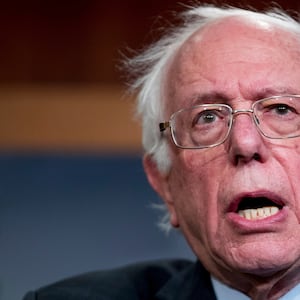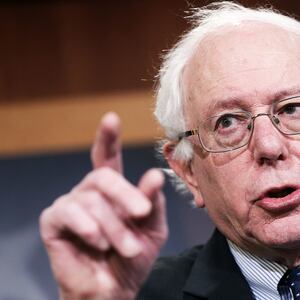Earlier this year, when Rep. Ro Khanna (D-CA) was talking with Sen. Bernie Sanders (I-VT) about his second presidential bid, the two talked for 15 minutes longer than expected. It wasn’t because the septuagenarian Vermonter had thoughts on the crowded primary field or the latest Trump scandal. Other things were on his mind.
“He spent 40 minutes talking to me about ideas in tech to rural and what is artificial intelligence going to do for jobs and what I can contribute intellectually,” Khanna told The Daily Beast. “And he spent the last five minutes being like ‘OK, so you know, here’s the policy, here’s what we got to do to win, maybe you could be a co-chair.’ Frankly, I found that really endearing.”
Khanna, who agreed to become Sanders’ co-chair, said it was “healthy” that the senator “didn’t have an obsession about politics, he had an obsession about policy.”
But not everyone on the team is as content with the same politics-policy balance.
As Sanders embarks on the early stages of his second presidential run, his aides and advisers are trying to figure out how best to balance the candidate’s often obsessive focus on his legislative agenda with a type of personal, inclusive touch that could potentially win over more Democratic voters. That tension has been manifested in everything from the composition of Sanders’ team to the degree to which he is willing to emphasize his own biography.
Whereas in 2016, Sanders launched his campaign with a sparsely-attended press conference outside the Senate, this weekend he will hold his first two events at places that played pivotal roles in his life journey.
The first event will be at Brooklyn College, where Sanders went to school before ultimately graduating from the University of Chicago. The son of a Jewish immigrant from Poland, Sanders grew up in a rent-controlled apartment in Flatbush. He has said that in his youth he came face to face with Holocaust survivors displaying numbers on their arms from Nazi concentration camps. His father’s family was wiped out by Adolf Hitler.
His second event, with Chicago’s Navy Pier as his backdrop, will reflect his history as a student activist during the Civil Rights Movement, the time when he resisted arrest at a demonstration against segregation in Chicago schools, and his attendance at the 1963 March on Washington.
Beyond the greater emphasis on biography, Sanders and his team have been tinkering with his campaign apparatus and political strategies in other, subtler ways. He hired Faiz Shakir, a young progressive activist who identifies as Muslim, to lead his campaign and staffed two women in top campaign posts as well, following criticisms from some alumni that the prior operation was too male and too white.
And the campaign recently cut ties with a team of consultants who produced glossy television ads for his 2016 run. That firm was led by veteran strategist Tad Devine, who told The Daily Beast that he’d worked on every Sanders’ campaign since 1996. The decision reflected a desire among elements of the Sanders campaign to rely more heavily on his sprawling digital presence and massive email list than well-produced television ads.
The changes have been driven, in part, by a recognition that Sanders needs to reach a larger sector of the Democratic electorate if he’s going to be able to secure the nomination.
“He’s trying to find his voice on this because honestly he hasn’t really had a voice of sharing [a] first-person narrative about him. It’s just literally not the way he operates,” Shakir told The Daily Beast, noting that as of Friday morning they were still going back and forth about some of the contents of the upcoming speeches.
But part of it is also because an emphasis on bio allows Sanders to draw a sharper contrast with President Trump, who grew up around the same time in the same city yet turned out starkly different than Sanders. One example of their different paths that Sanders team may emphasize is how, in the '60s, Sanders was charged with resisting arrest during a protest over school segregation while Trump began working at his father’s real estate company, which was later accused of racial bias towards prospective tenants.
“It’s almost a tale of two cities,” Khanna said of this dynamic. “Two such different experiences that lead to such different visions of what America should be.”
Whether Sanders can execute a bio-centric campaign push is another question. His campaign’s website emphasizes the slogan “Not me. Us.” And his discomfort in talking about himself was apparent throughout the 2016 campaign. Sanders made history as the first Jewish candidate to win presidential primaries and yet rarely discussed his faith. He had his own involvement in the civil rights demonstrations of the '60s but rarely talked about it even as many African-American voters flocked to Hillary Clinton.
“It was like pulling teeth to try to get him to talk about himself,” Nina Turner, a former Ohio state senator and now a national co-chair of Sanders’ 2020 bid along with Khanna, told The Daily Beast.
There were occasional moments when biography did come up.
“The one time I was able to get him to do it was when he came to my backyard in the city of Cleveland,” said Turner, referring to the March 2016 appearance by Sanders at the Olivet Institutional Baptist Church. “The senator did tell more of his history, and you could just hear people were just leaning on his every word. People were just enthralled, and to me, that’s his connection. To me, him telling his story cements his authenticity.”
And in a February 2016 primary debate, just days before Sanders would win New Hampshire by double digits, the senator issued a powerful closing statement talking about his father and linking it to his reasoning for running.
“My dad came to this country at the age of 17 from Poland,” Sanders said. “Didn't have any money, couldn't speak English, he died pretty young, and I think it would have been beyond his wildest dreams to see his son up here on this stage today running for president.”
But beyond those moments, the senator mostly declined to emphasize his own story and now his team has urged him to do so.
“It doesn’t come easy, it doesn’t come naturally,” said Shakir. “That said, he does believe that it is informative and helpful to the campaign for other people to know why he cares so deeply about some of these issues.”








